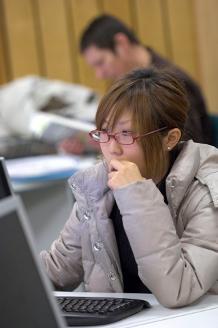The structure of a language: Korean
Aims
Aims
The module is a course in descriptive linguistics. It will develop understanding of grammatical properties of a language unfamiliar to the students, and develop techniques for inquiring into its structure. It provides an opportunity to apply principles of phonological, morphological, syntactic and sociolinguistic analysis to a particular language, and opportunity for systematic, detailed comparison of the grammar of English with that of another language.
The choice of language will vary from year to year. In this case, Korean.
The aims of this module are:
- To familiarise students with some linguistic properties of a language other than English
- To develop skills in comparative linguistics
- To allow students to apply principles of linguistic analysis to a language unfamiliar to them
At the end of this module, students will typically:
- Have an understanding of a small number of linguistic-theoretical problems discussed in current literature on a language other than English
- Have an experience of working in small groups of mixed background, offering one another mutual support
- Have experience of applying some aspect or aspects of linguistic theory to the analysis of data from a language other than English, and as a result, gain a better understanding of the relationship between data and analysis
Prerequisites
Prerequisites
If you are currently a second-year student, you must have successfully completed:
- L09C Introduction to phonetics and phonology (LAN0009C)
- L11C Introduction to syntax (LAN00011C)
If you are currently a final-year or year-away student, you must have successfully completed:
- L110 Elementary phonetics and phonology (4111110)
- L120 Elementary syntax (4111120)
Programme
Programme
Contact hours
Contact hours will be typical for an I-level module.
Lectures and seminars will be spread over the Spring and summer terms.
Teaching programme
The module will provide a linguistic overview of the language. It will cover the following topics:
- The basics of the language's morphology
- The basics of the language's syntax
- The basics of the language's phonology
- The social context and background of the language
Optionally, as appropriate:
- The writing system of the language
Note that the module is not intended as an introductory language course, and students on this module will not learn how to speak or write the language being investigated.
Assessment and feedback
Assessment and feedback
Feedback on formative work
- Seminar activities which relate to the assignments for the course
- Discussion and oral feedback to students individually or in groups
- Opportunity to meet with course instructor in weekly surgery hour
Assessment and feedback
- A dossier of work to be submitted in Week 6 of the summer term
- Feedback: Mark on University mark scale. Opportunity to see scripts at an appointed time before the end of Summer term.
Skills
Transferable skills developed in this module
All modules provide an opportunity to work on general oral/written communication skills (in class and in assessments) and general self management (organising your studies), alongside the specific skills in language or linguistics that the module teaches.
In addition, this module will allow you to particularly develop skills in the application of data analysis skills. This module provides you with an opportunity to learn how to integrate prior knowledge and skills, to solve new problems and tackle new questions by applying your all-round skills of linguistic analysis (learned in core modules in linguistics) to a new language whose structures will be largely unfamiliar to you.
Follow this link to hear how past students use transferable skills from their degree in their current jobs.

About this module
- Module name
The structure of a language: Korean- Course code
L14I (LAN00014I, 4190442)- Teacher
Shin-Sook Kim- Term(s) taught
Spring-Summer- Credits
20
